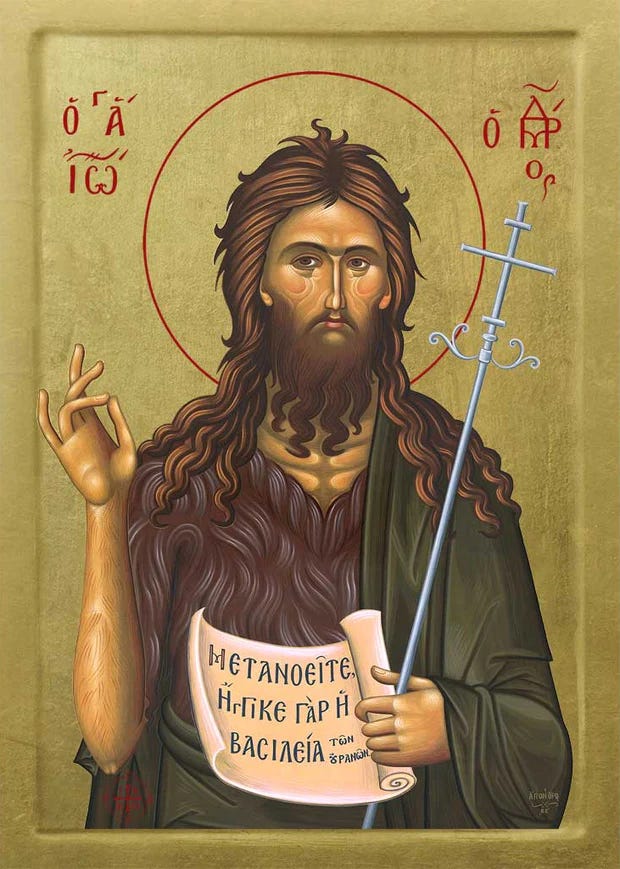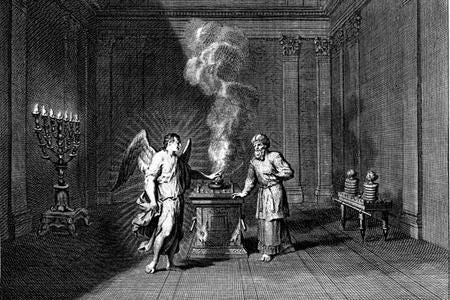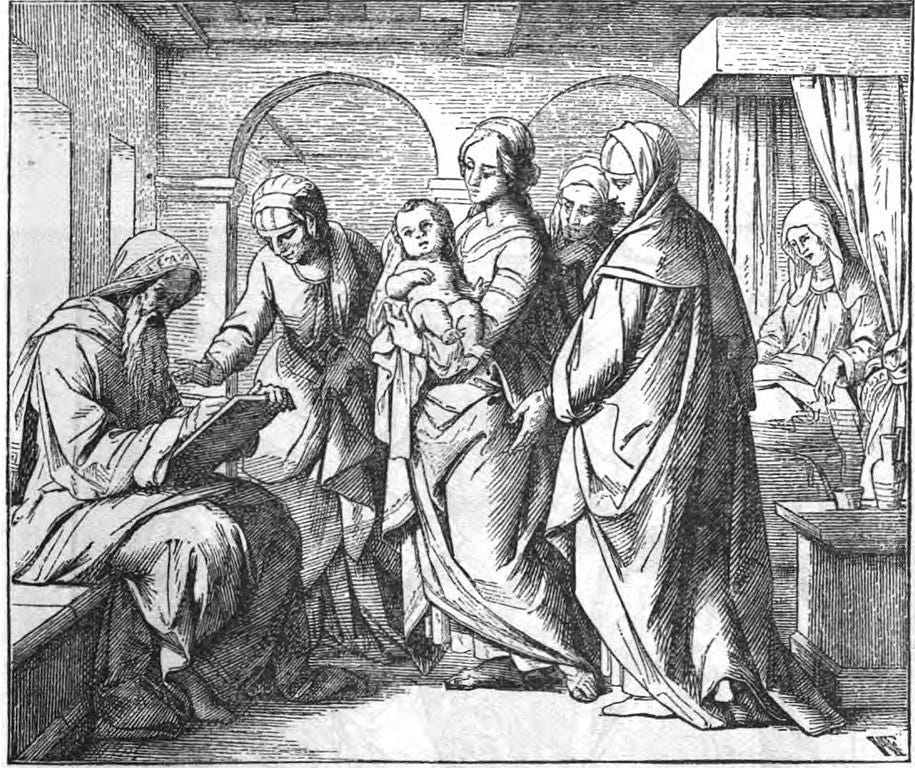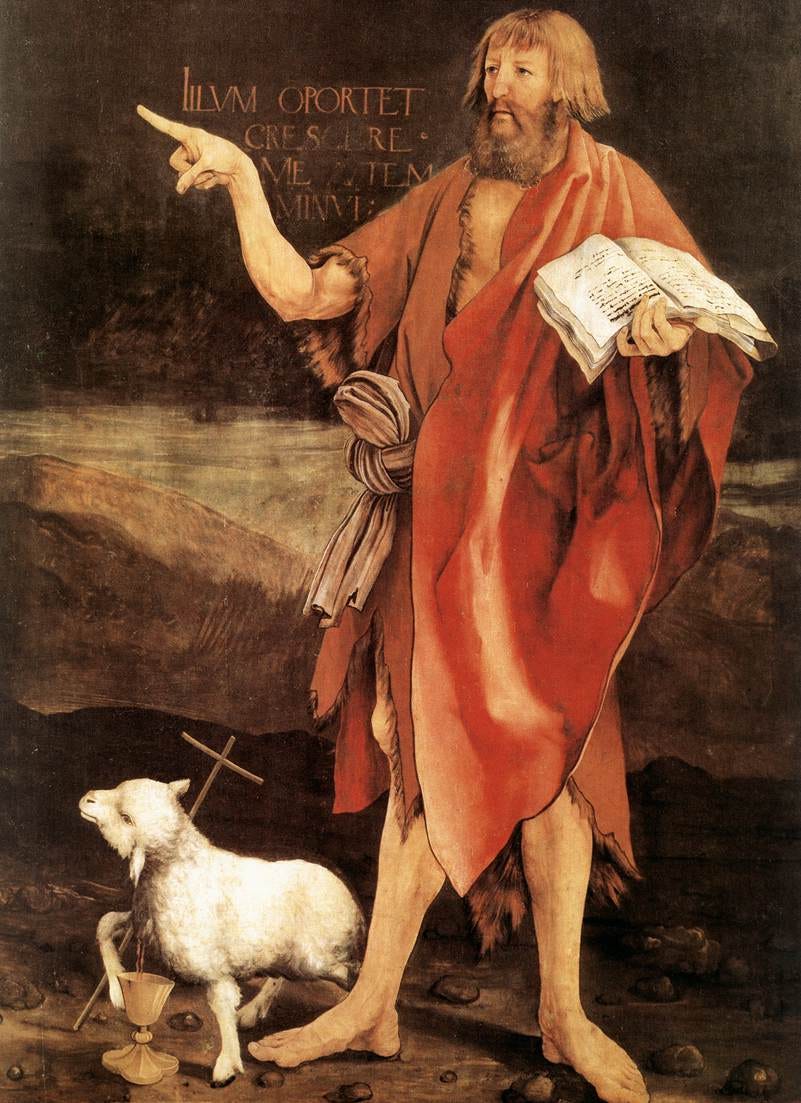+ In the Name of Jesus +
In those days John the Baptist came preaching in the wilderness of Judea, “Repent, for the kingdom of heaven is at hand.” (St. Matt. 3.1-2)
On Jordan’s bank the Baptist cries, announces that the Lord is nigh!
Awake and hearken for he brings glad tidings from the King of Kings!
Then cleansed be ev’ry life from sin, make straight the way for God within;
And let us all our hearts prepare for Christ to come and enter there!
The hymn skips us ahead to John’s ministry, where St. Matthew begins today’s Gospel reading, John preaching in the wilderness. But where did John the Baptist come from? Why was he so important and necessary?
John the Baptist’s history is celebrated every year by the Church, not just at Advent. I’m sort of partial to him because my ordination occurred on the Feast Day of the Nativity of St. John the Baptist, 24 June (2007).
It is good to emphasize that we know and can trust these dates when the Church celebrates things, contrary to what you hear from so called historians on National Geographic documentaries and other such channels and news outlets. Christians, for example, did not in any way take over an older pagan holiday or celebration and turn it into Christmas – that’s a common one. Stick with me for a moment on the math.
We know from Scripture that John the Baptist was conceived about six months before the Lord Jesus was conceived by the Holy Spirit in the Virgin Mary. (Luke 1.26) Thus celebrating the Nativity of St. John the Baptist on June 24… and we know from archeological work and looking at ancient documents when the Levitical priests were assigned by Levite family for work in the Temple, and Zechariah’s particular clan was scheduled roughly nine months before June 24. (See here and here for more information…) Thus, Christmas should be six months after June 24.
Further, the ancients believed, and the early Christians believed, that one died on the day when one was conceived. Some early church fathers believed the real Good Friday occurred on March 25. Thus they celebrated the Annunciation of our Lord – the conception by the Holy Spirit of our Lord Jesus in the Virgin Mary – on March 25, which of course, is exactly nine months before December 25.
What’s the point? We are not just randomly celebrating any of these Feast days and in particular the dates surrounding the life, death, and resurrection of Our Lord Jesus Christ. And one of the first things that happens in Luke’s Gospel is the story of St. John the Baptist’s origin – Luke does not start out telling us about John already grown up and preaching in the wilderness like Matthew, Mark, and John do. The Holy Spirit wants us to know why John is so special in the life story of our Lord and His holy Church.
St. John the Baptizer was miraculously born to elderly parents, Zechariah and Elizabeth, who were well past normal child-bearing age. If you remember the story, Zechariah was a Levitical priest serving his one chance in the Temple, near the Holy of Holies. It was a special day for him! There were so many Levites and only so many times a priest was assigned to serve. So naturally, you can imagine the surprise and incredulity of Zechariah when the angel Gabriel came to him when he was all alone burning the incense upon the incense altar before the curtain in the Temple.
“But the angel said to him, ‘Do not be afraid, Zechariah, for your prayer has been heard, and your wife Elizabeth will bear you a son, and you shall call his name John. And you will have joy and gladness, and many will rejoice at his birth, for he will be great before the Lord. And he must not drink wine or strong drink, and he will be filled with the Holy Spirit, even from his mother’s womb. And he will turn many of the children of Israel to the Lord their God, and he will go before him in the spirit and power of Elijah, to turn the hearts of the fathers to the children, and the disobedient to the wisdom of the just, to make ready for the Lord a people prepared.’” (St. Luke 1.13-17)
The angel’s news was unbelievable to Zechariah. Today we might be tempted to answer, “you’ve got to be kidding me.” He asks the angel for a sort of sign: “By what will I know this?” I am old, my wife’s days for childbearing have past, and she has the reproach of growing old without a child. His wife had a barren womb.
But with God nothing is impossible. For his misguided disbelief, Zechariah was stricken silent for nine months until the child was named. And the name of the child was to be John.
You all are helping me by allowing me to conduct today’s service as I am getting stronger in my long recovery from Covid. I appreciate being asked here today. By God’s grace, I can speak and I can preach and I can give you God’s glad tidings and blessings. But Zechariah came out of the Temple that day mute, unable to give the final benediction at the close of the service to the waiting congregation. Can you imagine your pastor turning to you at the end of the service having seen an angel and being stricken mute, unable to say the benediction? You would think you had seen something strange. “Depart in peace” would take a whole new meaning.
The next time Zechariah would speak, when the baby was born, Zechariah would write on a tablet, faithful to Gabriel’s instructions, that “His name is John.” (St. Luke 1.63). This was not a family name. And usually, first sons back then were named after their grandfather or father. But God had raised up His prophet with His power behind the boy. “His name is John.”
John’s name means, “Yahweh (the Lord, Jehovah) has been, or is become, gracious.” The name reflects that God chose John for a specific work – to prepare the way for the Christ, the one who embodies God’s grace or undeserved love to this fallen world. John is sent to preach this repentance and forgiveness, the knowledge of salvation in the Christ, in the forgiveness of sins through the Christ. The Lord, who forgives, who brings peace, who brings liberty to captives, who makes the deaf hear, the lepers cleansed, the lame walk, the blind see – who makes the barren conceive, who makes the Virgin conceive and bear a son. Immanuel. God with us. He is at hand. The Lord is nigh. That news had to be proclaimed to prepare all hearts for Immanuel’s coming.
John was privileged to point to and proclaim and reveal the grace of God in Jesus Christ, the fulfillment of all of God’s promises throughout the ages. “Behold the Lamb of God who takes away the sin of the world!”
John would point and say of Jesus at Jesus’ baptism in the Jordan River. John was able to see what the faithful prophets and patriarchs of Israel had all longed to see: the Lord, God in the flesh who comes and saves.
Yet, he would die, as all the prophets, before the “rest of the story” comes fully to fruition. John must be the one who dies, because all the prophets “died in faith, not having received the things promised, but having seen them and greeted them from afar, and having acknowledged that they were strangers and exiles on the earth… they desire a better country, that is, a heavenly one.” (Hebrews 11:13-16; ESV)
John greeted his cousin and Lord in person, and yet, from afar. He would die a martyr’s death before the Lord Himself would die, witnessing to His Lord’s death with his own blood, a forerunner to the grave. “I know that my Redeemer lives,” John could say, but to see His redeemer in all His salvific and resurrected glory was even for John a matter of faith – the assurance of things hoped for, the conviction of things not seen. John is not so different from all of us. We too must walk by faith, and not by sight.
For all of you are in a sense standing there in the wilderness of this sinful life, lives stained with sin and hearts inclined towards your sinful passions and lusts, indulging your fleshly desires, harboring grudges and jealousies, secretly hating and despising others, openly gossiping and slandering others and lying about too many things in life, and sometimes about nearly everything. Everyone who sins is lost and in need of the gracious entrance into your heart of the Lord Jesus Christ.
Into the wilderness of sin and death in which you are trapped, God comes to be with you. Listen to John: look in repentant faith past your fears and doubts and struggles and temptations and your hurting consciences to find your answers, your reassurance, your comfort in the words and promises of the Lord Jesus Christ, the God who comes in vengeance over sin and death and the power of the devil, the God who comes to save, to be near unto His people, to cast away the works of darkness, to gather back unto Himself a redeemed, restored, washed clean and purified, and one day, resurrected children of the day.
For this Advent we know that the Christ has come in the Bethlehem manger, incarnate in real time and place in this world, God’s Son, Mary’s Son, John’s cousin and brother, and your brother, in the flesh. He came to forgive the iniquity of His people, to save Adam, Eve, John, Mary, Zechariah, Elizabeth, every sinner, down to you and your children.
With His holy, precious blood, shed in His innocent suffering and death, Jesus Christ made good every expectation of every prophet and every prophecy and every martyr-blood witness, covering every sin. He rose from the grave on Easter day, springing up the signal to all the nations, the ever-living, never to die again shoot from Jesse’s stump, the first born of the dead, that He might revive us again at the last, bring life where there once was only death, bring a fruitful land where there once was only wilderness and desert, bring safety and peace where there once was danger and conflict. All who repent of sin and who believe in Him will rejoice in Him for all eternity and walk into the daylight serene, leaving behind the shackles of sin and death that weigh us down, nevermore to fear, nevermore to grieve, nevermore to be ashamed, nevermore to face death.
That is the man St. John the Baptizer was sent by God to point us all to: the Christ who is near, Jesus Christ, who comes to you, His saints, in preaching and Sacraments, that you might believe in Him and be saved. That is the man, Jesus Christ, who is near, who now comes or Advents to this altar in His holy body and blood, given and shed for you for the remission of your sins.
All praise, eternal Son, to Thee, whose Advent sets Thy people free:
Whom with the Father we adore, and Holy Spirit evermore. Amen.
+ In the Name of the Father, and of the + Son, and of the Holy Spirit +








Thank you, Pastor Sutton. This was beautifully written.